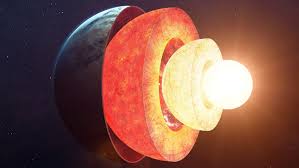Earth’s Core Has Reversed its Movement and Slowed Down: Understanding the Impact
The Earth’s core, a scorching hot ball of metal at the center of our planet, has made headlines recently. Scientists have discovered that the core has reversed its movement and slowed down. This phenomenon, known as “backtracking,” has left many wondering what it means for our planet and its inhabitants. Let’s delve into the details and explore how this change might affect us.
What is Backtracking?
The Earth’s core is responsible for generating our planet’s magnetic field. It rotates independently of the Earth’s surface, and its movement is crucial for maintaining the magnetic field. Backtracking refers to the sudden change in the core’s rotation, where it begins to move in the opposite direction. This phenomenon has been observed in the past, but the current event is unique due to its slow pace.
How was Backtracking Discovered?
Scientists from the University of Southern California made this groundbreaking discovery by analyzing seismic waves generated by earthquakes. By studying the waves that pass through the Earth’s core, researchers can determine the core’s rotation speed and direction. The team, led by Dr. John Vidale, observed seismic waves from over 100 earthquakes between 1991 and 2023 in the South Sandwich Islands. They found that the waves’ behavior indicated a significant change in the core’s rotation.
What Causes Backtracking?
The exact cause of backtracking is still unknown. Scientists believe it might be related to changes in the Earth’s magnetic field or the movement of tectonic plates. The core’s rotation is influenced by the Earth’s magnetic field, the mantle, and the outer core. Any changes in these components could impact the core’s rotation, leading to backtracking.
How will Backtracking Affect Us?
The Earth’s magnetic field might also be affected by the core’s slowed rotation. The magnetic field protects us from harmful solar radiation, so any changes to it could have significant implications. However, scientists are still unsure about the exact impact of backtracking on the magnetic field.
The Future of Earth’s Core
Researchers believe that the Earth’s core goes through cycles of speeding up and slowing down. The current slowdown is part of a 70-year cycle, and the core is expected to start speeding up again in the next five to ten years. This cycle is essential for understanding the Earth’s internal dynamics and how they impact our planet’s surface.
What does this Mean for Science?
The discovery of backtracking has significant implications for the scientific community. It highlights the complex and dynamic nature of the Earth’s interior. Scientists will continue to study the Earth’s core to better understand its behavior and how it affects our planet.
Conclusion
The Earth’s core has reversed its movement and slowed down, a phenomenon known as backtracking. While this change won’t have a significant impact on our daily lives, it’s essential for understanding the Earth’s internal dynamics. Scientists will continue to monitor the Earth’s core to uncover its secrets and better comprehend our planet’s behavior. As we continue to explore and learn more about our planet, we’re reminded of the awe-inspiring complexity and beauty of the Earth.



